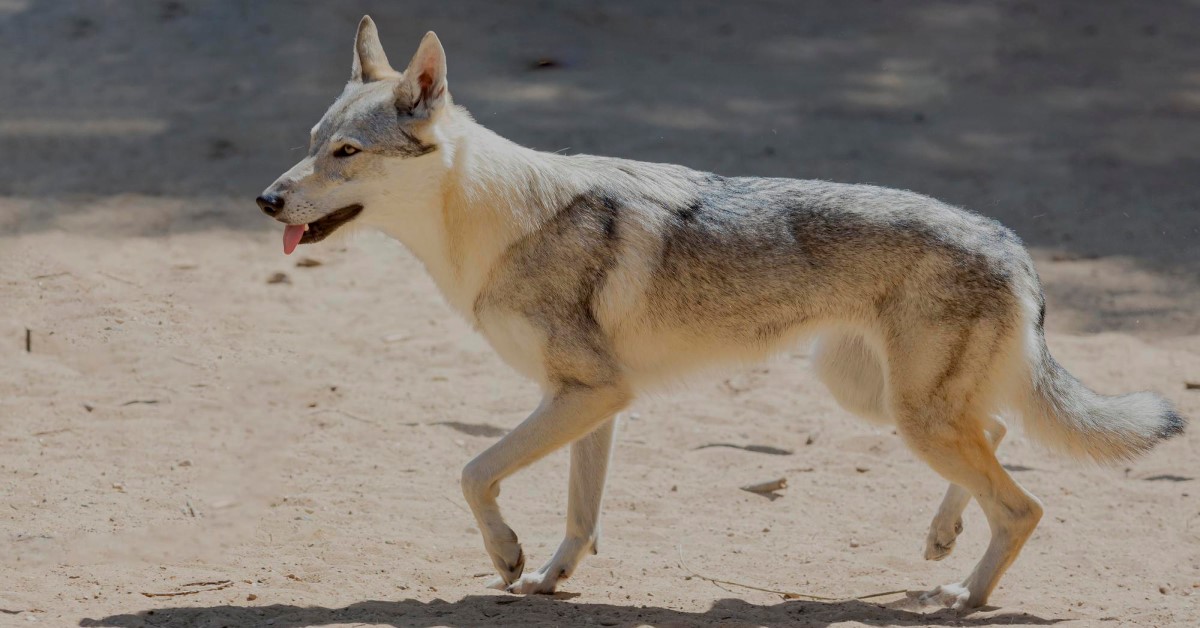How Wolf Dogs Are Different from Regular Dogs
Wolf dogs are fascinating creatures that possess many unique traits and characteristics that differ from regular domesticated dogs.

Wolves have long been perceived as mysterious creatures of the dark. They have held iconic roles in folklore for generations, from “The Three Little Pigs” to “The Boy that Cried Wolf.” Due to their high intelligence, curious nature, and devotion to family, humans are dedicated to breeding wolves that possess the best characteristics of both wolves and domestic dogs.
Referred to as wolf dogs or wolf-dog hybrids, these sophisticated animals share ancestry with full-blooded wolves. However, despite their close genetic relationship with wolves, wolf dogs have been carefully bred to be kept as domesticated dogs. Learn more about wolf dogs and the differences between these creatures and regular dogs.
What Is a Wolf Dog?
A wolf dog is a cross between a wolf and a domesticated dog. The breeding of wolf dogs and wolf hybrids continues to be a controversial topic as many believe these animals are dangerous due to their wild ancestors and instinctive predator nature.
There are currently no nationwide laws that prevent U.S. residents from owning wolf dogs. However, some states require residents to acquire permits or build special enclosures to keep wolf dogs as pets.
What are the Differences Between Wolf Dogs and Regular Dogs?
Despite shared genetics and an ability to interbreed, wolf dogs differ from regular dogs. Wolves are wild animals and have developed the keen skills needed to survive in the wild by finding food, protecting themselves from predators, and producing offspring.
Domestication occurs when a wild animal adapts to living with humans by being selectively bred over thousands of years. While dogs share a common ancestor with wolves, this centuries-long process of domestication has allowed them to live peacefully alongside humans in homes.
Wolf dogs may physically appear similar to wild wolves but have distinct physical and psychological differences that make them closer to domesticated dogs. However, these animals still have a long way to go toward becoming common household pets.
Here’s a close look at how wolf dogs differ from regular dogs:
Wolf-Dog Behavior and Temperament
One of the most noticeable differences between wolf dogs and regular dogs is temperament. Despite efforts to make wolf dogs act more like domesticated canines, this crossbreed has retained certain qualities and characteristics that can make them difficult to integrate into family households.
Unlike many easy going dog breeds like pugs, Golden Retrievers, bulldogs, and beagles, wolf-dog species are not always friendly and can be quite aggressive towards humans or other animals. Due to their large size and strength, wolf dogs are generally not recommended for the average household.
Wolf dogs are often more feral than your average domesticated dog. This means that most wolf dogs require extensive socialization and training before being integrated into society. As pack animals, wolves have instincts that drive them to protect their food source and mark their territory, traits that can be useful in the wild but unwelcome in households.
What Do Wolf Dogs Eat?
Domesticated canines require six basic nutritional components: water, fats, proteins, minerals, vitamins, and carbohydrates. Like wolves, dogs are carnivores; however, they have been bred to get their nutrition through sources besides meat.
Most dogs can thrive on commercial pet foods that contain all of the nutrients they need to maintain good health and wellness. Wolf dogs do not thrive on general commercial dog foods and do best on foods that they would generally eat in the wild, such as raw meats.
It is generally recommended to feed wolf dogs a raw diet that includes chicken, beef, or turkey. Raw pork should be avoided as it can contribute to digestive problems. In addition, wolf dogs require access to fresh grass and other vegetation, as well as occasional fruits.
As it can be difficult to get wolf dogs the nutrition they need in domesticated environments, many wolf dogs can benefit from nutritional supplements, such as vitamins A, B, C, D, and E, as well as glucosamine. Supplements like garlic, alfalfa, and wheatgrass can help lower the risk of common health issues, such as skin issues and arthritis.
Exercise and Training for Wolfdogs
While all dogs should have daily exercise, some breeds like French bulldogs and Chihuahuas are quite content lounging around the house. Wolf dogs, on the other hand, require a great deal of exercise, ideally three to four hours per day. Wolf dogs that are confined to homes without ample exercise can suffer from behavioral and health issues.
Due to their athleticism, wolf dogs generally need to be kept in an enclosed space with walls at least eight feet high. In addition, buried barriers with reinforced mesh should be placed along the base of the fence to prevent the animal from digging underneath.
Regular exposure to people and places can help wolf dogs better adapt to living with humans. However, wolf dogs can become skittish or fearful when exposed to public places, which can result in biting.
Spraying or neutering can help tame some of a wolf dog’s wild instincts. Extensive training, preferably by a professional, is essential to ensure that the wolf dog is not dangerous and can make a good indoor pet. However, even with training, wolf dogs can be unpredictable, meaning they should not be put in homes with small children.
Should You Keep a Wolf Dog as a Pet?
Wolf dogs are undeniably intelligent, beautiful animals that can make great companions. However, due to their unique differences from domestic dogs, they require a special owner who has the time, space, and passion to properly train them and meet their special nutritional and exercise needs.
Ready to start saving money on pet wellness care?
Then take a look at Mint Wellness, the pet wellness plan that provides fast reimbursement on routine pet care. Save on vaccinations, wellness exams, preventatives, dental, and more!
Learn More


